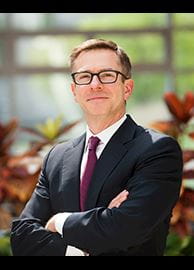"The Bear Stearns crisis was personally transformative. I couldn’t believe we were faced with these choices and that I would vote for them. We had to make real-time decisions about massive interventions."
Randall Kroszner
Deputy Dean for Executive Programs and Norman R. Bobins Professor of Economics

Imparting financial strategies, helping leaders navigate today's rapidly evolving business landscape.
It was March 2008 and the shares of Bear Stearns were in freefall. Without swift action, the investment bank would collapse.
Gathered at the Fed in Washington on a Sunday afternoon were Chairman Bernanke and the Fed Governors, including Randy Kroszner. They were about to make one of many consequential decisions to save Bear Stearns, a rescue that was a warning of the financial meltdown that was yet to come. Their choices were far from easy. In an unprecedented move, they invoked the Fed’s emergency powers in order to facilitate a takeover of Bear Stearns and create a program that would provide funding to other securities firms, expanding the ranks of organizations to which the Fed could lend directly.
Professor Kroszner, who served as a governor of the Federal Reserve from 2006 to 2009, recalls the “heart-pounding” nature of the experience. “The Bear Stearns crisis was personally transformative. I couldn’t believe we were faced with these choices and that I would vote for them. We had to make real-time decisions about massive interventions.”
The stakes were high during the 2008-2009 financial crisis, and the stakes are high today. Like the financial crisis, the COVID-19 pandemic has revealed fragile interconnections in a number of systems, which have serious implications for businesses. Nevertheless, Kroszner says that companies can prepare for these risks. “There are no innocent bystanders when it comes to risk management. Just because you can’t predict a global pandemic doesn’t mean you can’t be prepared. A framework that breaks down macro vulnerabilities into risk factors you can control allows you proactively to manage the impact of events outside of your control. I wanted to create a program that provides senior executives with this proactive risk and reward framework while also delivering a toolkit to help them communicate effectively to key stakeholders when their organization’s reputation is on the line.”
The result is a highly interactive live-online program, High-Stakes Decisions: Managing Risk and Reputation, which gives senior leaders the tools to identify and anticipate a broad set of risks – not only the risks in their direct control, but also ones that can result from external forces such as pandemics, supply chain disruptions, financial crises, terrorism, and cybersecurity threats. The program hones their ability to lead and communicate during times of change, uncertainty, and crisis by tackling important issues such as how to convey bad news, diffuse negativity, and tackle tough questions.
Kroszner reflects, “I’m pleased to be teaching this program alongside Lucia Annunzio, President and CEO of The Center for High Performance and strategic advisor to CEOs of leading global companies. Lucia has worked directly with boards of directors and senior teams to help them make high-stakes decisions by demonstrating how to confront harsh realities and to break down complex problems into components that are simpler to solve.”
Offered in a series of focused 90-minute live segments over five weeks, the program fits into the busy schedules of senior executives and provides an opportunity to reflect and apply program concepts in between sessions. It also fosters an environment where senior leaders can share experiences and engage with the faculty and each other not only during the class sessions but also through group projects, after-class hangouts, and a virtual "fireside chat."
Both Kroszner and Annunzio also teach in the two CFO programs at Chicago Booth: The Executive Program for Prospective CFOs, and the Latin America Senior Executive Program.